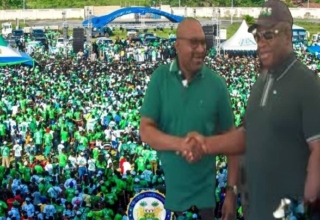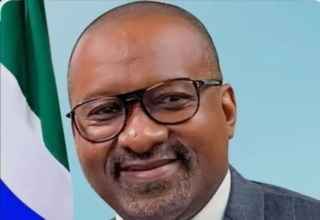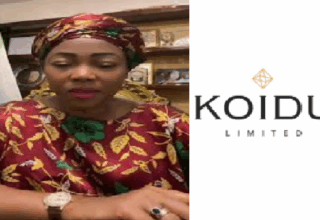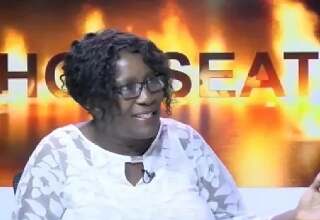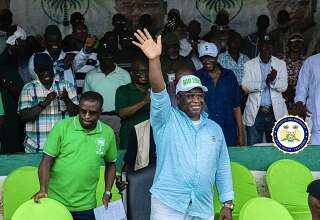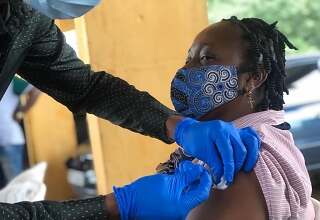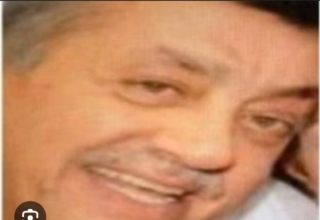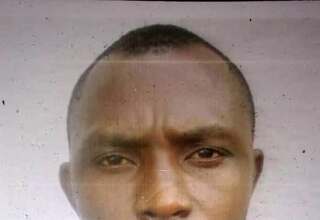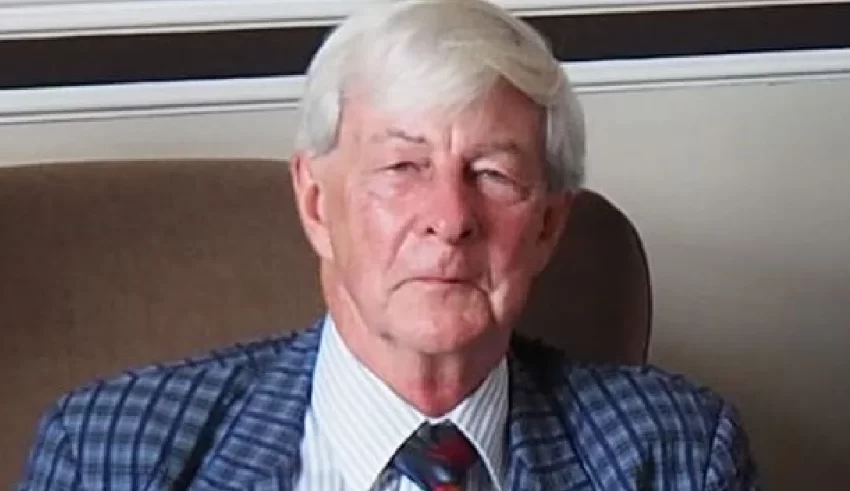
𝐁𝐲 𝐋𝐚𝐧𝐬𝐚𝐧𝐚 𝐆𝐛𝐞𝐫𝐢𝐞.
Ambassador Peter Alfred Penfold, who has died aged 79, was so deeply attached to Sierra Leone that it was almost certainly the last foreign country he visited from his Oxfordshire home. He arrived in late November 2022 and stayed for weeks. It was one of dozens of visits to Sierra Leone since his zeal in service of the country led to a premature end of his long diplomatic career, in 2000. This one attracted media attention because Mr. Penfold, accompanied by the British High Commissioner Lisa Chesney, presented elegant portraits of dozens of Paramount Chiefs in Sierra Leone in he had commissioned to the National Museum in Freetown. He saw himself as one of them: he had been crowned Pa Komarabai-Chief of Chiefs-in Northern Sierra Leone in recognition of his remarkable role in helping defeat the brutal rebel junta, the Armed Forces Ruling Council (AFRC), and restoring democracy in 1998.
We had dinner during that trip in 2022: he had been my friend and mentor for around 20 years. His pleasure at his being honoured as a Grand Chief was undiluted: he liked to appear on occasion in the traditional gown carrying a very distinguished walking stick. He was even more deeply committed to supporting the Blind School, the main focus of his many visits to Sierra Leone. He published a children’s book, Joe Abu Goes to School, to help raise funds for the Blind School, in addition to countless other activities in its support.
Mr. Penfold was not one given to half measures: his commitment to any cause was total. I worked with him closely in mobilizing support for Chief Hinga Norman, for whom Mr. Penfold had acquired a strong affection because of the staunchness of his determination to resist and oust the AFRC. When Chief Norman was indicted by the UN-backed Special Court for Sierra Leone, Mr. Penfold went into action in defence of Norman, including testifying in his behalf at the court in Freetown and persuading General Sir David Richards, now Baron Richards of Herstmonceux and formerly Britain’s Chief of Defence, to similarly testify. Richards had been the commander of British forces in Sierra Leone whose decisive action in 2000, coordinated with Penfold, saved Freetown from falling hands of murderous rebels again.
To the end Mr. Penfold regarded all those he interacted with and liked during his service as UK’s High Commission in Sierra Leone (1997-2000), and especially during the struggle to oust the AFRC and restore the elected government of President Ahmad Tejan Kabbah, as comrades. He was always the first to alert me to the death of any of them. When former Chief Justice Desmond Luke passed in February 2021, the email alert to me came from Peter. The last email alert about another comrade from that struggle came to me from Peter on 20 March 2021. It read: “Dear Lans, First Desmond, and now Joe Demby. I am losing all my close friends and colleagues. Stay safe. Best wishes, Peter.” It is heartbreaking rereading this email: one of the marks of advancing age is that one gets to mourn the death of one’s close friends way too often, driving home a premonition of one’s own mortality.
In Ambassador Penfold’s death, Sierra Leone has lost its staunchest foreign friend, benefactor and defender. I will miss his amiable company and very wise counsel very dearly.
I reproduce below a review I wrote of Mr. Penfold’s book, ‘Atrocities, Diamonds and Diplomacy: The Inside Story of the Conflict in Sierra Leone’, a copy of which the publishers, Pen and Sword, UK, sent to me in 2012.
Pambazuka:
Nov 15, 2012
This ‘superbly well-written, well-documented and passionate book’ reveals tragic failures of the international community in tackling the civil war in Sierra Leone.
Peter Penfold was UK’s High Commissioner to Sierra Leone from 1997 to 2000 when his services were terminated after disagreement with Tony Blair’s New Labour government over Sierra Leone – over the so-called ‘Arms to Africa’ scandal of 1998. Blair’s government told him to keep quiet after his recall and premature retirement after 40 years of service, but he refused. Penfold became the most prominent critic of the Special Court for Sierra Leone (SCSL), a contrivance chiefly of Blair’s Foreign Secretary, Robin Cook, whose pretensions to an ‘ethical foreign policy’ had been exposed by events in Sierra Leone. Penfold has now published a much-anticipated book about his experiences in Sierra Leone and at the hands of Blair’s New Labour. The book had tremendous difficulty finding a publisher in the UK, but has now been issued by Pen and Sword, the imprint of the British army. Penfold’s old friend and collaborator in Sierra Leone, General Sir David Richards, wrote the Foreward to the book, hailing Penfold as ‘a brave and determined British diplomat of the Old School’, and the book as a ‘compelling story of one man’s resolute determination to do the right thing.’
I first met Peter Penfold in the summer of 2003 in London. He had been recalled a couple of years back as the UK’s High Commissioner to Sierra Leone following a most tumultuous and extraordinarily effective service there, and had been seconded to the Department of International Development (DFID) on the recommendation of Clare Short, who herself would not long after leave Tony Blair’s now-discredited government. I had been invited to participate in a study, largely funded by the UK government, on making UN peace operations more effective. (The study was designed to follow-up on the findings of the famous Brahimi Report on UN peace operations in 2000). Penfold was a senior member of our team – representing DFID. Knowing of his reputation, I was awed by his presence on the team. His views carried great weight, but he was always somewhat diffident about what a foreign intervention force can achieve. Context, he would stress, matters. He was insistent on one point: external intervention (ECOWAS, UK and UN) in Sierra Leone was successful largely because it was driven by the principle – accepted by the vast majority of Sierra Leoneans – of support for the democratically elected government of Ahmad Tejan Kabbah against anti-government forces about with little or no support anywhere in the country, and about whom there was nothing ennobling. Penfold formed this view of the Revolutionary United Front (RUF), the then largely amorphous and nihilistic group spearheading a brutal bush war, a few weeks after he arrived in Sierra Leone as Britain’s top diplomat there in early 1997. Everything that happened to the country since then merely confirmed his early impressions.
We travelled as a team to Sierra Leone for the research. Once we got to the arrival hall at the airport and Penfold was spotted, the normally vacant or avaricious airport workers sprang into action, and took us all into the VIP lounge. In Freetown, there was hardly any need for prior appointments: Penfold’s name opened every office. When we went to see President Kabbah, there was a television crew waiting to record the event, and it was the lead news item that evening. Penfold, though now shunned by his own Foreign Office, was a hero in Sierra Leone: he had been crowned honorary Paramount Chief in the country, the only British official to be so honoured after Prince Phillip. This very important and much anticipated book tells us why he is still revered in Sierra Leone, and much more.
Diplomats from powerful countries who find themselves in degraded or corrupt countries can do one of two things. They can comfortably immerse themselves into the local environment, make friends with the political and business elite, and sit out patiently until they are moved to more salubrious environments or are comfortably retired. That is the careerist option. The other option is to try and do something to influence positive change in the country they find themselves posted, to use the leverage of a representative of the important power which helps subsidise the local government can wield to get things moving in the right direction. This is the more difficult option, for it carries a grave risk. A foreign diplomat falling out with the local government, however insanitary that government is, often finds that his own bureaucracy, full of nibbling careerists who are instinctively against risk-taking, are unsympathetic, and wants to immediately rid of that awkward diplomat. As it happens, the British Foreign Office, with its sense of antique propriety and residual imperial viciousness, is the most practiced and ruthless at this kind of thing.
Penfold’s predicament in Sierra Leone was worse. He arrived in Freetown in March 1997 to take over as UK’s chief diplomat in the country. He drove from Senegal through Guinea into Sierra Leone, adding drama to an already high-octane situation. Sierra Leone had in the months prior conducted national elections, and the new president – an articulate and presentable former UN civil servant, Kabbah – had signed a peace agreement with the RUF in neighbouring Abidjan, Ivory Coast. Those were glimmers of hope in an otherwise awfully bleak situation: the RUF war, which started in March 1992, had already killed more than 15,000 and devastated the countryside, forcing the displacement of half the population of the country.
Amidst this carnage, the international community, including Britain, the country’s former colonial master, pretended that things were under control. Donor funding had been secured for the elections (Britain contributed $3 million), but now what? In the UN Security Council, the US vetoed the setting up of a small military observer force following the signing of the Abidjan Accord on grounds that the RUF had not approved it. Earlier, an important British humanitarian assessment report (April 1995) had fretted about labeling Sierra a ‘complex emergency’ since this would ‘unleash a whole set of responses, including the appointment of a UNSRSG [Special Representative of the Secretary General”>, a Humanitarian Coordinator, and new arrangements for UN working in Sierra Leone.’ This deliberate failure to act when it could have made a decisive difference must be implicated in the subsequent carnage in the country – which finally led to the deployment of one of the largest UN peacekeeping troops ever (UNAMSIL), at a cost of $2.5 million in five years.
In the event, both the elections and the Abidjan Accord would become only seriously effective in terms of the country’s international relations in their breach: as reaction to the sanguinary Armed Forces Ruling Council (AFRC) coup of May 1997. No coup has been more ill-timed.
Penfold had previously served in the British mission in Nigeria during that country’s civil war in the late 1960s, in Ethiopia in the 1970s during the neurotic Derg revolution, and in Uganda in the 1980s during two coups. In Sierra Leone, he quickly became a passionate advocate for the democratically-elected government, helping to fundamentally change the UK’s policy towards the country. His efforts gained immense traction when Blair became Prime Minister on 2 May 1997, a few months after Penfold took post, and only three weeks before the fateful AFRC coup. Blair’s father had been a lecturer at Sierra Leone’s Fourah Bay College, and though Blair made this discovery much later, he characteristically embraced it with missionary zeal. That changed attitudes within the British establishment towards Sierra Leone: the sentiments of a popular new Prime Minister perforce quickly became state policy.
Blair’s earnest moral tone – he and his foreign secretary Robin Cook spoke about an ‘ethical foreign policy’ – seemed congruent with the field reports Penfold was sending back, in which Penfold depicted the war in Sierra Leone as a conflict in which there was a clear division between good and bad – on one side the legitimate, democratically-elected government and on the other a bunch of thugs without a reasonable political agenda. The AFRC coup of May 2007 made this view compelling.
Penfold’s account of the coup and its consequences are the most stirring parts of immensely riveting book – and the best I have read anywhere. His valiant attempts – aided by other diplomats and notably the courageous Desmond Luke – to cajole the mutinous soldiers failed, but it is worth studying closely for the astonishing possibility it offered. Promised money, cars and a comfortable exile, Johnny Paul Koroma and his gang agreed to cede power back to Kabbah, but this was scuttled by the RUF, which had been invited by Koroma to join his ‘peoples’ army.’ Penfold then organised one of the most complex evacuations of foreign nationals from a war zone ever – an effort that involved several planes and warships from Britain, France and the US, among others. In the final episode in the evacuation drama, the USS Kearsarge landed dozens of heavily armed marines and positioned combat helicopters all around Lumley beach in Freetown, overlooking the main military barracks where the AFRC officers and their RUF allies had based themselves. The junta had one combat helicopter, and the Americans made a point that though they were not authorised to strike at the junta, the helicopter was a danger to foreign nationals and would be destroyed if it took off the ground. Interventionists prayed for that to happen, and at one point the junta’s only pilot was seen walking towards the helicopter. Suddenly he turned back, failing to perform a terminal service for the rest of humanity: had he moved closer, the marines would have blasted him apart along with the helicopter, and in the ensuing firefight, the rest of the AFRC thugs would doubtless have been obliterated. (That helicopter, by the way, was later used by the junta to destroy villages in places like Moyamba and Bonthe, killing hundreds, on the excuse that they were habouring Kamajors.)
For his leadership role during the evacuation, Penfold received letters of commendation from both Blair and Cook. He was now based in Guinea along with the exiled Kabbah government. There is little doubt that without his support Kabbah, a reluctant flagbearer if ever there was one, would not have sustained the resistance against the AFRC. And it was in providing this support that Penfold, in the latter judgment of his senior colleagues in London, may have faltered. It involved what came to be famously known as ‘Arms to Africa’ scandal: an agreement between the exiled government and a British mercenary outfit, Sandline International, to supply arms to pro-government forces resisting the AFRC in Sierra Leone. Penfold was accused of facilitating the deal, though he had fully briefed the Foreign Office in London about the negotiations going on between Kabbah and Sandline’s Tim Spicer. The problem was that at that time there was a UN Security Council-mandated arms embargo on Sierra Leone, and the resolution had been sponsored by Britain. The scandal – or so the British press called it – was first publicised by Lord Avebury, an unctuous Liberal peer whose motives were extraneous to Sierra Leone’s interests. It turned out that the arms themselves never actually got to the pro-Kabbah forces: they were impounded by Nigerian troops, who must be credited – along with the pro-government Kamajor militia fighters – for unseating the AFRC and restoring democracy to Sierra Leone. But the ill-fated arms had been shipped out to Sierra Leone, and the fidgety and dull civil servants in London could not be persuaded that a law had not been broken. It didn’t matter that the spirit of the resolution clearly did not intend the ban to apply to the exiled government – who Blair called the ‘good guys’. The episode, described here in painful detail, wrecked Penfold’s career.
It led to his early retirement, and even there he was not left alone by the British government. When he was in 2002 offered the post of Africa Program Director by the International Crisis Group (ICG), for which he was eminently qualified, the offer was quickly withdrawn ‘on the advice of senior figures in the Foreign Office’.
Penfold is rarely judgmental about the politicians and diplomats he deals with in this book, though he is sharply critical of American machinations in the run-up to the shambolic Lomé Accord. The story of how Jesse Jackson, Bill Clinton’s Africa adviser, manipulated and coerced Kabbah into an outrageous peace agreement is now well known, but Penfold adds useful details. Jackson took Kabbah in his plane from Ghana and he refused to allow James Jonah and Julius Spencer – two of Kabbah’s closest aides, and both known anti-RUF hardliners – to travel alongside. In Lomé, American lawyers drafted both the ceasefire agreement and the final accord. Foday Saybanah Sankoh, the self-adoring RUF leader, indulged himself in an ‘orgy of food, drink and sex’ in a Lomé hotel, and mounted a bill of over $400,000, to be paid by the UN. Britain sent an inexperienced and disinterested diplomat with no knowledge of Sierra Leone to Lomé, leaving Penfold uninvited in Freetown. The result, Penfold writes bitterly, was that the US and Britain ‘acted disgracefully in forcing through the Accord.’ (The Accord in effect made Foday Sankoh Vice President and gave him control of the country’s mineral resources, including its coveted diamonds. For good measure, the flippant Jesse Jackson compared Sankoh to Nelson Mandela at the time.)
What does Penfold really think of Kabbah, the man at the centre of all this drama? Clearly, Penfold had far greater respect for Hinga Norman – an activist minister after Penfold’s heart – and enormously admires Desmond Luke, James Jonah and the great activist at the time, Zainab Bangura. Kabbah was merely a symbol of the great struggle for democracy, though a rather flawed one. Penfold’s judgments of Kabbah are made by accretion – and two impressions stand out. Kabbah was too quick to flee Sierra Leone after the coup announcement in 1997, and in exile in Guinea, Kabbah did not once visit either the Sierra Leone government office – converted from a disused restaurant – or even the Sierra Leone embassy (where hundreds of his exiled countrymen met every day) a few yards from his house. When, in the aftermath of the devastating January 1999 attacks Penfold visited Kabbah, he found a thoroughly devastated and lonely man who had not even taken the time to visit the national stadium, where tens of thousands of his derelict people had sought shelter. (Penfold had earlier been there, distributing medicine, food and other necessities). To be fair to Kabbah, at this point he been struck – in addition to the calamities of the rebel onslaughts – with a great personal tragedy: his wife of many years had only recently died, and he was already a very broken man (he never actually recovered from that tragedy, as anyone close to him knows.)
Penfold’s harsh judgment of the Special Court for Sierra Leone (SCSL), which was set up in 2002 to try those ‘most responsible’ for the atrocities of the war and which recently convicted former Liberian President Charles Taylor (among others), deserves to be quoted at length. He writes: ‘Supporters of the court, citing the example of Charles Taylor…say that it demonstrates that no one can get away with such barbarous acts with impunity…However, Sam Norman’s indictment and subsequent death is a stain on the Special Court’s legacy. Who else will come forward to fight the cause of peace and democracy in the future if they face the threat of being treated as a war criminal? Resolving conflicts diplomatically elsewhere has become more difficult as a result of the Special Court’s antics. When resolving conflicts it is usually necessary to persuade both sides of the conflict to cease fighting and killing, lay down their weapons and negotiate a peaceful agreement. Often this will require not only understanding, patience and skillful diplomacy but also some form of concessions such as pardons and/or amnesties. The Special Court demonstrated that such provisions and assurances negotiated on the ground in good faith become meaningless once the juggernaut of international justice comes on the scene. What incentive, therefore, will there be for some of those involved to stop fighting.’
It is a sobering thought – and from a man who witnessed firsthand the atrocities of the Sierra Leone – documented here in great detail – as well as the efforts to end it through negotiation.
Of some curiosity is the title of the book ‘Atrocities, Diamonds and Diplomacy’, since Penfold never subscribed to the hamfisted view – peddled by the likes of David Crane, the Special Court’s first prosecutor – that the Sierra Leone war was all about diamonds. Diamonds were important in funding the war and ensuring the sustained interest in support the RUF by the likes of Charles Taylor, but the war was not caused by diamonds, he writes.
This superbly well-written, well-documented and passionate book should be read by everyone interested in Africa, as well as in the grave issues of war and peace.

